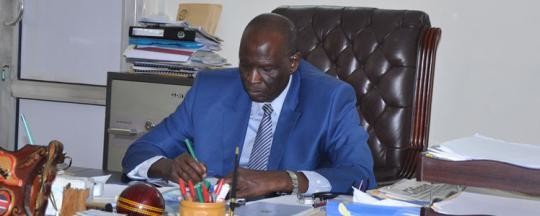The elder son of the Governor of the Bank of South Sudan Kornelio Koriom Mayik is heavily involved in currency trading in Juba at several different financial institutions. This represents a major conflict of interest for the central bank governor whose job involves regulating forex bureaus and banks.
South Sudan’s central bank is responsible for regulating foreign exchange dealers including banks, forex bureaus and other financial institutions, according to the Bank of South Sudan Act of 2011.
Government and business sources confirmed to Radio Tamazuj the involvement of Bol Koriom Mayik in currency trading in South Sudan’s capital Juba.
He runs multiple forex bureaus in Juba, according to an official at the central bank. Another source, a currency trader in Juba, also linked Bol to a domestic commercial bank.
The bank source further said that Bol was one of a group of people who have been pushing for the central bank to take back management of the ‘Letter of Credit’ system from other government institutions to which it devolved this responsibility in 2012.
In an interview, Bol would neither confirm nor deny that he runs a number of forex bureaus as well as holding shares in several foreign and domestic commercial banks in the country on behalf of his father and the family as the eldest son.
He responded angrily to questions about his reported involvement in these businesses saying, “That is not your business to ask whether I have a business or not. It is not right.”
He did comment on the current dollar scarcity, however, blaming it not on central bank policies but on low global oil prices and reduced oil outputs.
“The markets are experiencing huge pressure, which requires collective efforts to addressing this situation. The current situation needs the government, the business community and the citizens to work together. It is a situation which cannot be handled by one entity,” said Bol.
He said the central bank has suspended dollar transfers to commercial establishments in the country. “It is now a long time since commercial banks and forex bureaus stopped receiving allocations from the central bank. This is due to the scarcity of the dollars,” he said.
Lack of bank supervision: risks of ‘illicit transactions’
The Bank of South Sudan has fixed the value of the South Sudanese pound to the dollar at a rate of about 3 to 1, a rate three times less than the ‘black market’ street rate. Only licensed forex bureaus and banks can get dollars from the central bank at this rate, besides also certain companies given a ‘Letter of Credit’ by political decision-makers in various government ministries.
Currency traders have told Radio Tamazuj that some of the companies and forex bureaus that buy dollars from the central bank at the official rate in turn trade them at the black market rate for a profit, further driving down the value of the pound and reducing the availability of dollars at official sales points.
The International Monetary Fund (IMF) has warned that this system “entails a hidden transfer of resources from the government to those with privileged access to foreign exchange at the official rate.”
The organization has recommended better regulation of foreign exchange houses. In a report last December the IMF hinted that some forex bureaus are linked to the black market. IMF noted that the number of banks and forex houses in South Sudan is “excessive” compared to the size of the country’s financial system.
“Generous licensing of new banks and foreign exchange houses pose risks, including of money laundering and illicit transactions, not least because of limited capacity to supervise them,” the IMF reported, urging close regulation of licencees.
‘Artificial’ dollar price
IMF’s Executive Board has recommended that South Sudan’s central bank change the official exchange rate to a “realistic level” so that not only politically connected individuals but also ordinary citizens and businesses can access dollars.
“The reform will eliminate the large transfer of funds from the government to a few beneficiaries and provide reliable and transparent access to foreign exchange for the public and businesses,” reads the IMF’s December report.
“Unification of the exchange rate will help reduce the large demand for dollars created by the artificially low price at which they could supposedly be purchased. It will also signal a commitment to transparency and remove incentives for corruption.”
‘Conflicts of interest’
Central bank regulations require that Governor Kornelio Koriom Mayik confidentially disclose the assets of his children to the Board of Directors of the Bank of South Sudan.
The Bank of South Sudan Act of 2011 says that the bank governor, deputy governor and other senior officials must annually “make confidential declaration of their assets, liabilities and business and financial interests including those of their spouses and children.”
According to the same law, the Board of Directors is responsible for setting “specific policies governing conflicts of interest relating to the officials and staff of the Bank.”
File photo: Bank Governor Kornelio Koriom Mayik
Related:
IMF: South Sudan currency policy enables ‘hidden transfer of resources’
Officials profiting from South Sudan dollar shortage: report




